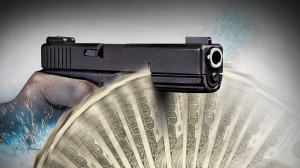Your Tax Dollars At Work
< < Go Back
Does the Second Amendment apply to poor Americans? Ask that question to Connecticut Gov. Dannel Malloy and other anti-gun politicians who want to charge exorbitant fees and taxes in order to limit gun ownership and curtail practice of the right to keep and bear arms.
A tax is the best form of offense. At least, that seems to be the growing consensus within the weird and desperate enclaves of America’s ever-creative gun control movement. Having seen public opinion swing strongly behind the Second Amendment—and having watched in horror as a majority on the Supreme Court affirmed that English words have meaning—the restrictionists and the tut-tutters have been forced to focus their attentions on an underrated weapon against the right to bear arms—money. If you can’t ban them, bill ’em instead.
The taxman gets around. In 2016, having had its total ban on handguns struck down by a judge, the Northern Marianas Islands swiftly imposed a $1,000 excise tax on all pistol purchases. Explaining his decision, the Islands’ governor was blunt: “I don’t think anyone here in this office wants to see handguns on the street. Unfortunately, however, the only option we have is to make regulations as strict as possible.”
As it turned out, he didn’t have that “option” at all, for as UCLA’s Adam Winkler observed, the measure had represented little more than a “naked attempt to circumvent” the ruling, and was in effect an effort to “tax a constitutional right out of existence.” In consequence, it, too, was nixed by the courts.
But not all such ploys have been—or will be. In February of this year, Gov. Dannel Malloy of Connecticut proposed quadrupling the fees that attach to the state’s pistol permits—from $70 to $300 for a permit renewal. The plan, Malloy suggested, would help close the state’s $3.6 billion deficit—by raising $9 million. Challenged by voters, Malloy pointed defensively to neighboring New York City, in which a purchase permit costs $427 and a concealed-carry permit is almost impossible to obtain. By changing Connecticut’s rules, the governor told skeptics, he would be making the two jurisdictions “comparable.”
Indeed, he would. And yet, far from helping his case, the link that Malloy is drawing here serves only to give away the game: namely, that this isn’t about money so much as it’s about control.
More From America’s 1st Freedom:




